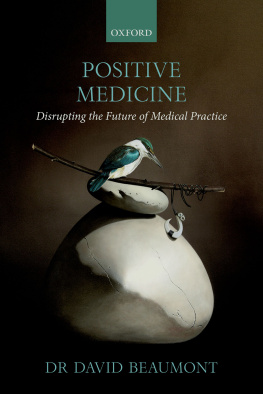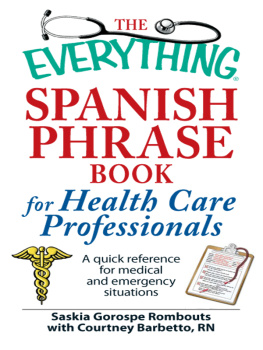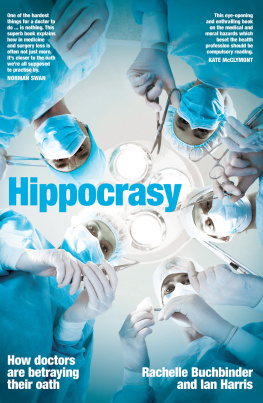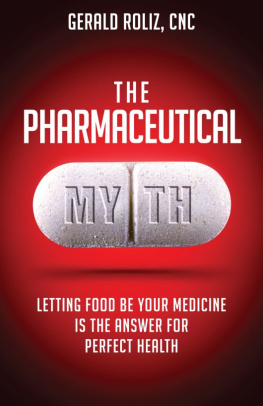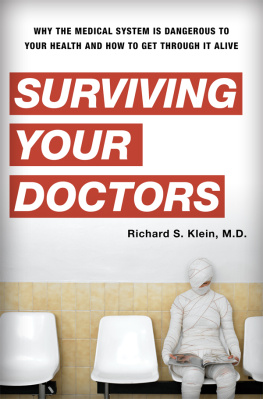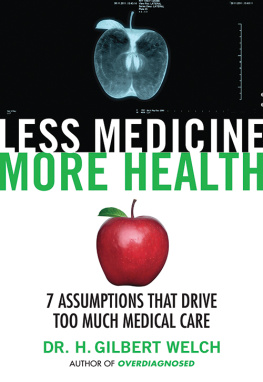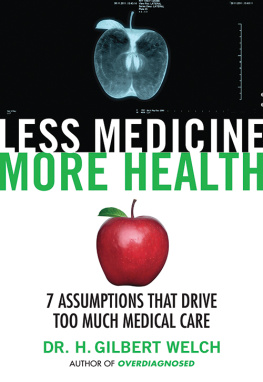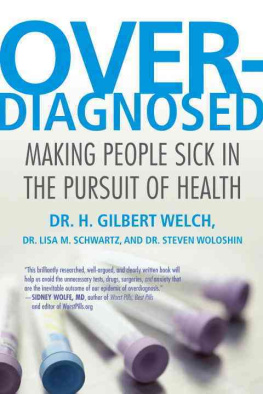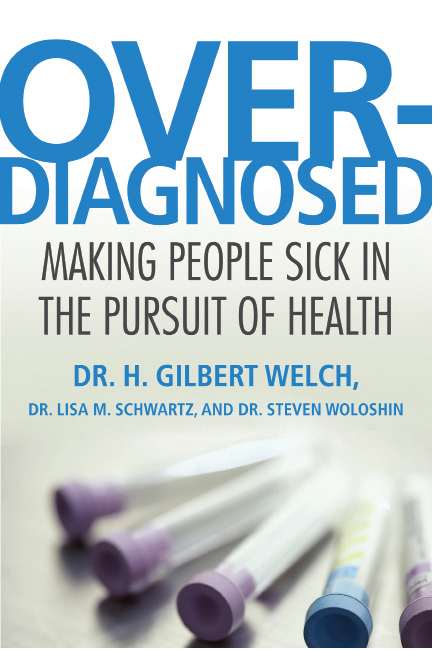Overdiagnosed
Making People Sick in the Pursuit of Health
Dr. H. Gilbert Welch
Dr. Lisa M. Schwartz
Dr. Steven Woloshin
Beacon Press Boston
To my mother,
Katharine Smith Welch
(19202010)
Contents
People Become Patients with High Blood Pressure
How Numbers Get Changed to Give You Diabetes, High Cholesterol, and Osteoporosis
How Scans Give You Gallstones, Damaged Knee Cartilage, Bulging Discs, Abdominal Aortic Aneurysms, and Blood Clots
How Screening Made It Clear That Overdiagnosis Exists in Cancer
How Screening Gives You (and Your Baby) Another Set of Problems
How Genetic Testing Will Give You Almost Anything
Introduction: Our Enthusiasm for Diagnosis
My first car was a 65 Ford Fairlane wagon. It was a fairly simplealbeit largevehicle. I could even do some of the work on it myself. There was a lot of room under the hood and few electronics. The only engine sensors were a temperature gauge and an oil-pressure gauge.
Things are very different with my 99 Volvo. Theres no extra room under the hoodand there are lots of electronics. And then there are all those little warning lights sensing so many different aspects of my cars function that they have to be connected to an internal computer to determine whats wrong.
Cars have undoubtedly improved over my lifetime. They are safer, more comfortable, and more reliable. The engineering is better. But Im not sure these improvements have much to do with all those little warning lights.
Check-engine lightsred flags that indicate something may be wrong with the vehicleare getting pretty sophisticated. These sensors can identify abnormalities long before the vehicles performance is affected. They are making early diagnoses.
Maybe your check-engine lights have been very useful. Maybe one of them led you to do something important (like add oil) that prevented a much bigger problem later on.
Or maybe you have had the opposite experience.
Check-engine lights can also create problems. Sometimes they are false alarms (whenever I drive over a big bump, one goes off warning me that somethings wrong with my coolant system). Often the lights are in response to a real abnormality, but not one that is especially important (my favorite is the sensor that lights up when it recognizes that another sensor is not sensing). Recently, my mechanic confided to me that many of the lights should probably be ignored.
Maybe you have decided to ignore these sensors yourself. Or maybe youve taken your car in for service and the mechanic has simply reset them and told you to wait and see if they come on again.
Or maybe you have had the unfortunate experience of paying for an unnecessary repair, or a series of unnecessary repairs. And maybe you have been one of the unfortunate few whose cars were worse off for the efforts.
If so, you already have some feel for the problem of overdiagnosis.
I dont know what the net effect of all these lights has been. Maybe they have done more good than harm. Maybe they have done more harm than good. But I do know theres little doubt about their effect on the automotive repair business: they have led to a lot of extra visits to the shop.
And I know that if we doctors look at you hard enough, chances are well find out that one of your check-engine lights is on.
A routine checkup
I probably have a few check-engine lights on myself. Im a male in my mid-fifties. I have not seen a doctor for a routine checkup since I was a child. Im not bragging, and Im not suggesting that this is a path others should follow. But because I have been blessed with excellent health, its kind of hard to argue that I have missed out on some indispensable service.
Of course, as a doctor, I see doctors every day. Many of them are my friends (or at least they were before they learned about this book). And I can imagine some of the diagnoses I could accumulate if I were a patient in any of their clinics (or in my own, for that matter):
From time to time my blood pressure runs a little high. This is particularly true when I measure it at work (where blood pressure machines are readily available).
Diagnosis: borderline hypertension
Im six foot four and weigh 205 pounds; my body mass index (BMI) is 25. (A normal BMI ranges from 20 to 24.9.)
Diagnosis: overweight
Occasionally, Ill get an intense burning sensation in my midchest after eating or drinking. (Apple juice and apple cider are particularly problematic for me.)
Diagnosis: gastroesophageal reflux disease
I often wake up once a night and need to go to the bathroom.
Diagnosis: benign prostatic hyperplasia
I wake up in the morning with stiff joints and it takes me a while to loosen up.
Diagnosis: degenerative joint disease
My hands get cold. Really cold. Its a big problem when Im skiing or snowshoeing, but it also happens in the office (just ask my patients). Coffee makes it worse; alcohol makes it better.
Diagnosis: Raynauds disease
I have to make lists to remember things I need to do. I often forget peoples namesparticularly my students. I have to write down all my PINs and passwords (if anyone needs them, they are on my computer).
Diagnosis: early cognitive impairment
In my house, mugs belong on one shelf, glasses on another. My wife doesnt understand this, so I have to repair the situation whenever she unloads the dishwasher. (My daughter doesnt empty the dishwasher, but thats a different topic.) I have separate containers for my work socks, running socks, and winter socks, all of which must be paired before they are put away. (There are considerably more examples like this that you dont want to know about.)
Diagnosis: obsessive-compulsive disorder
Okay. I admit Ive taken a little literary license here. I dont think anyone would have given me the psychiatric diagnoses (at least, not anyone outside of my immediate family). But the first few diagnoses are possible to make based solely on a careful interview and some simple measurements (for example, height, weight, and blood pressure).
More are possible if a doctor were to order any one of a number of diagnostic tests for me. Even routine blood worka complete blood count, an electrolyte panel, and liver function testsinvolves more than twenty separate measurements. The chances are good that I would have at least one abnormal value.
And then theres imaging. Lots of people have abnormal findings on X-ray studies. If I had a chest X-ray, I wouldnt be surprised if a lung nodule was seen. If I had an abdominal CT scan, I wouldnt be surprised if a cyst on my kidney was found.
Further inspection could reveal more. A colonoscopy might show that I have polypsas about a third of people my age do. A prostate biopsy might demonstrate a small cancerwhich many men have, even if their PSA (prostate-specific antigen) screening tests are normal. And its a safe bet that my genome contains all sorts of genetic variants.
To be fair, most doctors wouldnt order any imaging studies; some might have skipped the routine blood work. Nonetheless, several of these diagnoses could have been made.
Would I be better off if I were given these diagnoses? I dont think so. Would I be put on prescription medications? Probably. Would I consider this good medical care or bad? Id say bad. But enough about me. This book is about the millions of Americans who have access to what some would call the best medical care in the world. Of course, there are millions of other Americans whose access is severely limitedthe uninsured. This is a real problem, but not the topic of this book. The problems described here are actually less likely to happen to the latter group, simply because they receive less medical care. This book is about the relentless expansion of medicine and our increasing tendency to make diagnoses.


